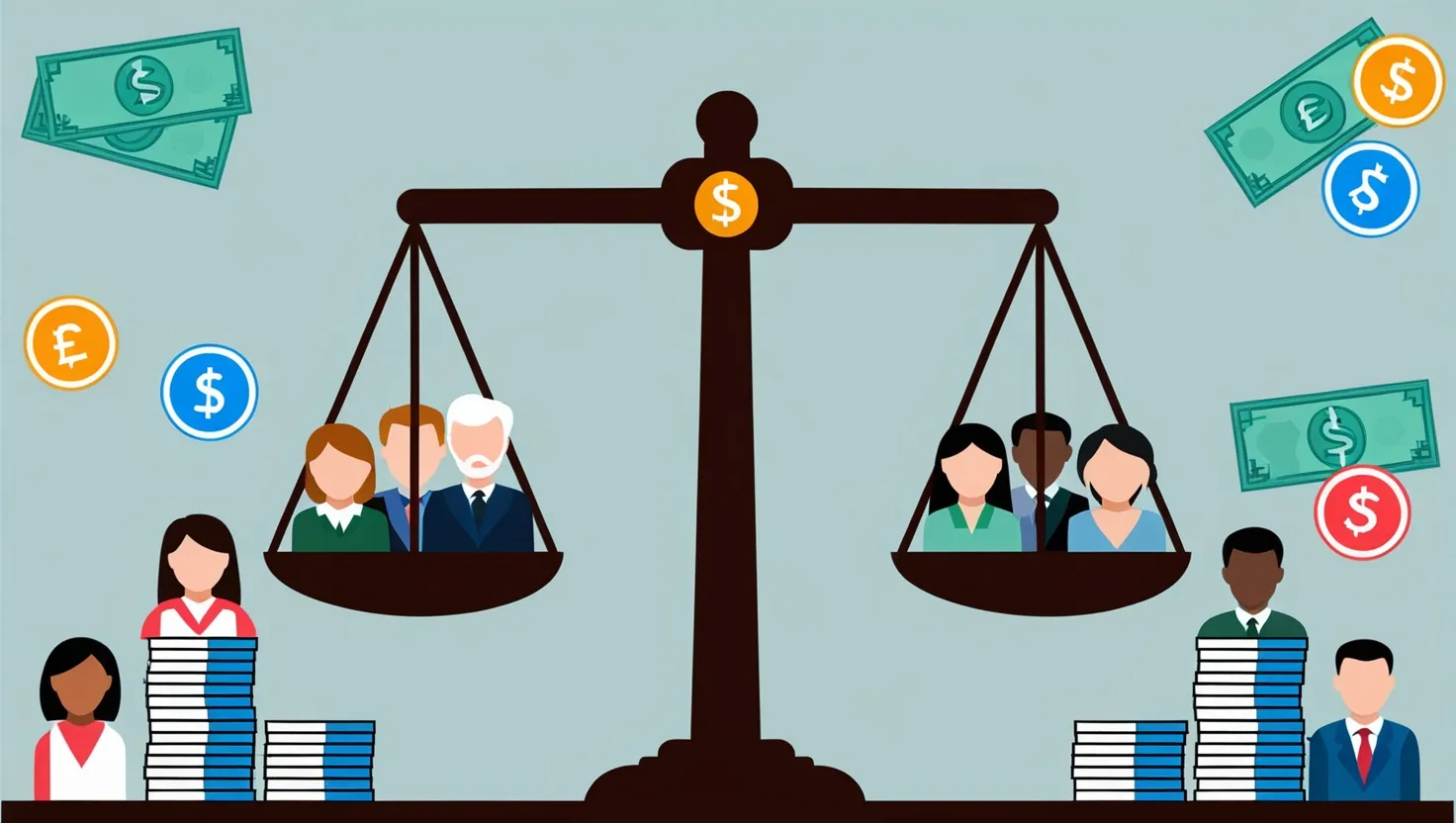So, when people talk about recessions, they're basically discussing a period when the economy isn't doing good. Imagine it like this: for at least six months, everything economic—spending, jobs, manufacturing—starts to slow down or even shrink.
History's had its fair share of these downturns. Think back to the Great Depression in the 1930s, which was like the granddaddy of all economic bad times, or the more recent Great Recession that kicked off in 2007, thanks to a housing market crash. These moments are crucial; they shake things up, forcing changes in how we manage money, both in our pockets and in government coffers.
Even though recessions can be tough, they're also a chance to reset and rethink how we do things. They remind us to be a bit smarter with our finances, both personally and as a society. By looking back at how we've navigated past downturns, we can pick up some tips and tricks for dealing with future ones.
One key indicator often used to identify a recession is when a country's Gross Domestic Product (GDP) — basically, the total value of all goods and services it produces — shrinks for two consecutive quarters. Think of GDP as the scoreboard of the country's economic health. When it goes down, it means the economy isn't performing as well as it should; businesses might be making less money, people might be spending less, or both.
Why Do Recessions Happen?
There's a bunch of reasons why an economy might hit the brakes. Sometimes it's a big, unexpected shock—like oil prices skyrocketing or a global pandemic (yeah, looking at you, COVID-19). Other times, it might be because people are spending less or there's a bubble in the economy that suddenly bursts. And before you know it, jobs are harder to find, and businesses might start closing their doors.
High Interest Rates
Imagine borrowing money becomes more expensive because interest rates are high. When that happens, both people and businesses cut back on spending and investing because loans are pricier. Less spending means companies make fewer sales and might cut back, leading to slower economic growth.
Falling Consumer Confidence
This is all about how people feel regarding their financial future. If consumers are worried, they're likely to save more and spend less. This reduced spending can affect businesses and, in turn, the economy at large, creating a domino effect that can lead to a recession.
Decreased Employment
Jobs are the backbone of the economy. When unemployment rises, fewer people have money to spend, which means businesses suffer from decreased sales. This can lead to more layoffs, creating a vicious cycle that can push the economy into a recession.
Inflation
Too much inflation, or the rate at which prices for goods and services rise, can be a bad thing. It erodes purchasing power, meaning people can afford less with the same amount of money. To combat inflation, central banks might raise interest rates, which, as mentioned before, can slow down economic activity.
External Shocks
These are unexpected events that hit the economy suddenly, like natural disasters, oil price shocks, or pandemics (COVID-19, for instance). They can disrupt supply chains, halt production, and lead to job losses and decreased consumer spending, all of which can contribute to a recession.
Financial Crises
When banks or financial systems hit a rough patch—think of a major bank failing or a stock market crash—it affects the entire economy. Credit (money borrowed or lent) becomes harder to get, businesses can't expand, and consumers cut back on spending, leading to a recession.
Global Downturns
In today's interconnected world, a recession in a major economy can have a ripple effect across the globe. International demand for goods and services can decrease, affecting economies worldwide.
Government Debt
High levels of government debt can also lead to a recession. If a government spends more than it earns, it may need to cut spending or raise taxes. Both of these actions can reduce overall demand in the economy and potentially lead to a recession.
Impacts of Recession:
Recessions, while a normal part of the economic cycle, can have widespread impacts across various sectors of society and the economy.
Employment and Income
One of the most immediate and visible impacts of a recession is increased unemployment. As businesses face lower demand and decreased revenue, they often cut costs by reducing their workforce.
For those still employed, wages may stagnate or decrease as companies strive to lower expenses, affecting workers' purchasing power and standard of living.
Many individuals may find themselves working in part-time positions or jobs that do not fully utilize their skills, further impacting income levels.
Business Sector
The decreased consumer spending during a recession can lead to higher rates of business failures, particularly among small and medium-sized enterprises.
Uncertainty about the future often leads companies to delay or reduce investments in new projects, innovation, and expansion efforts, slowing economic growth even further.
Consumer Behavior
With job security in question and income levels dropping, consumers tend to cut back on spending, particularly on non-essential goods and services, exacerbating the downturn.
Those who can afford to may increase their savings as a precaution against future financial uncertainties, further reducing the money circulating in the economy.
Public Services and Welfare
As more people lose jobs and income, the demand for public assistance and social services increases, putting pressure on government budgets.
Governments facing reduced tax revenues may be forced to cut back on public services and infrastructure projects, impacting education, healthcare, and community services.
Mental Health and Social Well-being
Financial insecurity and job loss can lead to significant stress, anxiety, and other mental health issues among affected individuals and their families.
High unemployment rates and economic uncertainty can lead to increased social tensions, crime rates, and a decline in overall societal well-being.
Global Economy
Recessions can lead to a decrease in international trade as countries import and export less due to reduced demand.
Developing countries may be hit particularly hard as investment flows decrease and the market for their exports contracts.
Housing Market
As consumer confidence wanes and fewer people can afford to buy homes, the housing market often suffers, leading to falling prices and increased foreclosures.
The construction industry can experience significant downturns due to decreased demand for new homes and commercial properties.
Navigating Recession with Little - No Pain:
Budgeting and Spending
Tighten your budget by distinguishing between wants and needs. Focus on essential expenses and find ways to cut back on non-essentials.
If you don’t already have an emergency fund, start building one. Aim for savings that can cover at least three to six months of living expenses.
Value Investing
Golden Security: Safeguarding Your Future with Gold
Nithin Bharadwaj • Dec 31, 2023

Gold for Emergency Funds: An emergency fund is a financial safety net designed to cover unexpected expenses or financial emergencies. The primary purpose of an emergency fund is to provide immediate liquidity and financial security in cases of unforeseen circumstances such as job loss, medical emergencies, urgent home repairs, or any other critical situa…
Read full story →
Look for ways to save money on daily expenses. Use coupons, shop sales, and consider cheaper alternatives for services and goods.
Debt Management
Prioritize paying off high-interest debts, such as credit card balances, to reduce interest payments.
Consider consolidating debts to lower interest rates and monthly payments.
If you’re struggling to make payments, communicate with your creditors to negotiate terms. Many institutions offer hardship plans during economic downturns.
Income Security
Look for opportunities to diversify your income. This could mean taking on freelance work, part-time jobs, or exploring passive income streams.
Use the time to upskill or reskill. Online courses and certifications can make you more marketable and open up new job opportunities.
Strengthen your professional network. Networking can open doors to new opportunities and offer support during job transitions.
Investing and Savings
If you have investments, try to maintain a long-term perspective. Historically, markets recover over time.
Review your investment portfolio and consider if you need to adjust your risk exposure based on your financial situation and goals.
Continue saving, even if it’s a small amount. Automatic transfers to savings accounts can help build your emergency fund over time.
Planning for the Future
Have a plan in place for potential job loss or other financial shocks. This includes understanding your unemployment benefits, having updated resumes, and knowing your options for health insurance.
Use this time to improve your financial literacy. Understanding personal finance, investment, and economic principles can empower you to make informed decisions.
Summary:
Understanding Recession
- A recession is typically identified by two consecutive quarters of negative GDP growth, indicating a significant downturn in economic activity.
- Various factors can trigger a recession, including high interest rates, falling consumer confidence, decreased employment, inflation, external shocks, financial crises, global downturns, and high levels of government debt.
- Recessions can lead to job losses, business failures, decreased consumer spending, strain on public services, mental health issues, and a downturn in the housing market.
Navigating Recession for Individuals
- Tighten your budget, focus on essentials, and look for ways to save on daily expenses.
- Prioritize paying off high-interest debt and consider consolidation options or hardship plans if necessary.
- Diversify income sources, invest in skill development, and strengthen your professional network.
- Maintain a long-term perspective on investments, adjust risk exposure as needed, and continue saving regularly.
- Adopt a frugal lifestyle, prioritize health and well-being, and make use of free or affordable resources for entertainment and personal growth.
- Prepare for potential financial shocks with an emergency plan, and enhance financial literacy to make informed decisions.
Key Takeaways
- Effective preparation and the ability to adapt to changing economic conditions are crucial for navigating recessions.
- Recessions, while challenging, also present opportunities to reassess financial priorities, improve resilience, and position oneself for growth post-downturn.
- Leveraging community resources and support networks can provide additional stability and resources during tough economic times.






